Shimano’s newest Deore M6100 12-speed groupset takes key elements of its range-topping XTR M9100 system and packs them in an affordable, good-looking and top-performing package that’s hard to criticise.
We covered the launch of the Deore groupset in detail back in May 2020 and have been testing the 12-speed M6100 groupset ever since.
This review represents just under 700km of off-road riding in the Tweed Valley and has highlighted some of the new groupset’s best – and most annoying – traits.
- Mountain bike groupsets: everything you need to know
- Road bike groupsets: everything you need to know
M6100 12-speed groupset headline figures:
- Total weight (including 170mm cranks with 30t chainring, BSA73 bottom bracket, rear derailleur, chain, 10-51t cassette and shifter): 2,201g
- Total price (including cranks, chainring, rear derailleur, chain, 10-51t cassette and shifter): £285.95 / $297.95 / AU$539.50
The new Deore groupset isn’t just available in a 12-speed configuration, there are also fresh 10- and 11-speed versions, but this review focuses on the 1x-only M6100 12-speed groupset.
Shimano Deore M6100 groupset specifications and details
Shimano Deore FC-M6100-1 crankset with 30t chainring
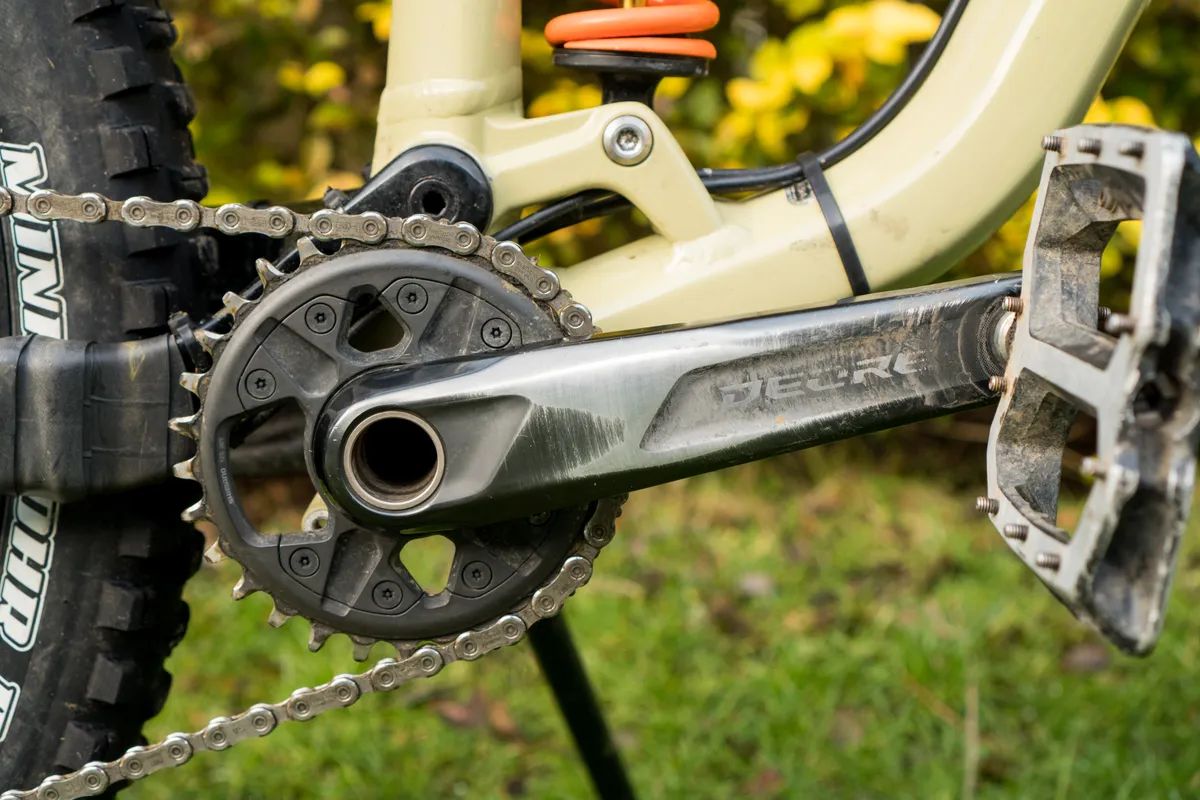
The latest Deore cranks don't use Shimano’s long-standing HollowTech technology – where the crank arms are forged as two hollow pieces and bonded together – instead they use a forged construction with a trellised rear to save weight while retaining strength.
However, the bottom-bracket axle does use HollowTech II technology, where the bottom-bracket axle is integrated into the right-hand (driveside) crank arm. This is clamped to the bottom bracket using pinch bolts and tightened with a preload cap.
The cranks come in 170mm or 175mm lengths, and have enough chainline and Q-factor options to suit any modern bike. They’re available with either a 30t or 32t narrow-wide ‘Dynamic Chain Engagement+’ chainring with alternating tooth thicknesses, often referred to as ‘narrow-wide’, that’s fitted to the cranks using Shimano’s direct-mount system.
This means chainrings from Shimano’s other ranges will fit, increasing the available tooth options.
The Deore FC-M6100-1 170mm crankset with 30t chainring I tested weighed 782g on my scales.
Shimano Deore SL-M6100-R shifter
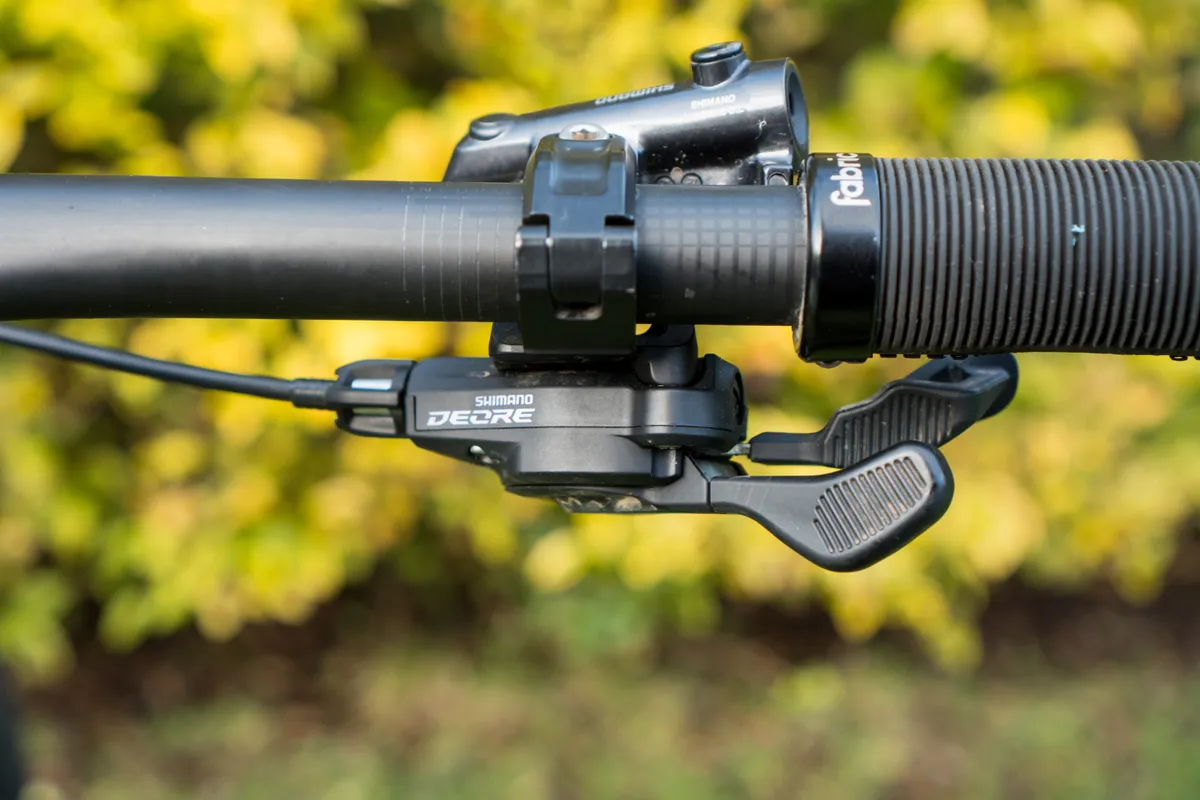
Deore now gets I-Spec EV compatible shifters that feature Rapidfire Plus technology – where three low gear shifts can be done with one push of the lever – and the brand’s much-loved two-way release high-gear shifter.
However, you don't get multi-release (where the high gear release trigger can be used to shift two gears at once, as seen on XT and XTR). A single push of the small paddle only shifts one gear at a time. The shifter’s lever paddles are textured to aid with grip.
My I-Spec EV shifter with supplied gear cable weighed 130g. The bar clamp band version adds 4g.
Shimano Deore RD-M6100-SGS rear derailleur
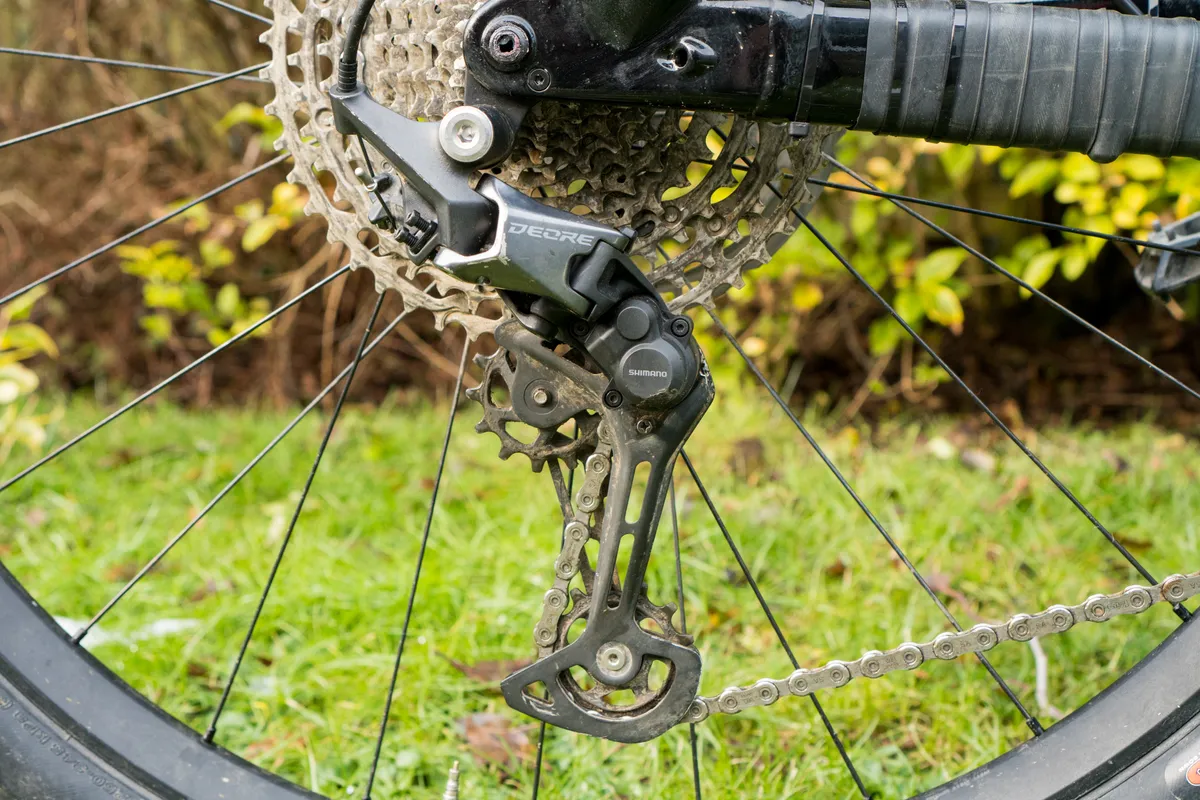
The rear derailleur features Shimano’s Shadow RD+ technology – where the mech has a low-profile design that reduces the chances of it hitting the chainstay as it pivots over rough terrain, and has an adjustable and on/off switchable clutch to reduce chainslap and improve mech shifting accuracy.
Totally disengaging the clutch aids wheel removal, letting the cage rotate on its pivot freely. The overall look of the derailleur is very similar to Shimano’s more expensive SLX, XT and XTR offerings.
The derailleur’s cage is made from steel rather than alloy or carbon, though, and the 13-tooth jockey wheels spin on bushings rather than sealed cartridge bearings.
The 12-speed version is limited to a maximum 51t low gear and a 10t high gear – the same as Shimano’s 12-speed cassettes. Unlike SRAM’s offerings, but in the same vein as the rest of Shimano’s MTB groupsets, the shifting cable enters the derailleur vertically rather than horizontally.
The Deore RD-M6100-SGS rear derailleur weighed 320g on my scales.
Shimano Deore CS-M6100-12 cassette and Shimano Deore CN-M6100 chain
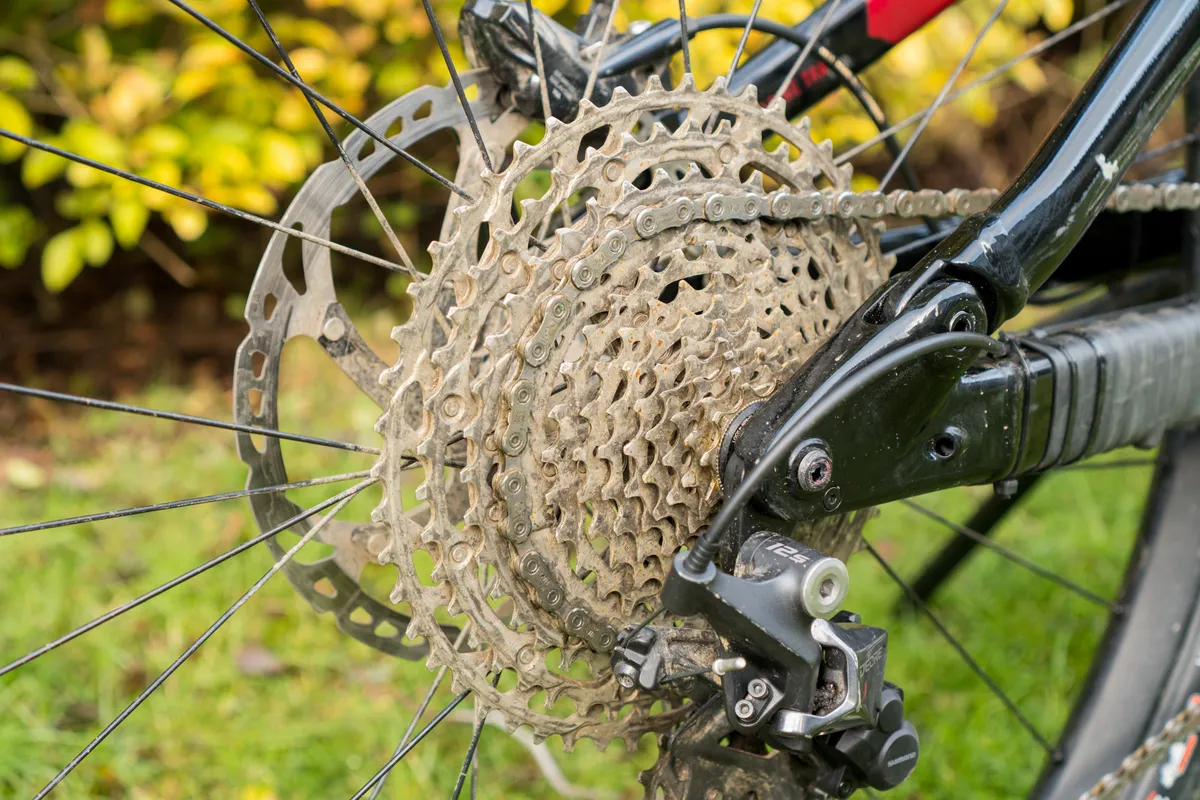
Both the Deore 12-speed cassette and chain feature Shimano’s Hyperglide+ ramps and profiling. This is claimed to enable shifting up and down the cassette while under power by helping the chain transition between the sprockets more smoothly.
To take full advantage of the cassette’s Hyperglide+ system, it's highly-recommended to use a Shimano chain despite third-party products being unofficially compatible.
The CN-M6100 Deore chain is direction-specific; the stamped Shimano writing must face outwards when fitted to a bike. The chain, like the chainring, features ‘Dynamic Chain Engagement+’ tech that’s used to help keep the chain on the ring without a chain device.
My CN-M6100 Deore chain with matching quick-link at its full length weighed 280g.
Along with Hyperglide+ technology, the CS-M6100-12 cassette uses Shimano’s Microspline cassette and freehub body standard to enable it to accommodate a 10-51t sprocket range.
The cassette uses pinned steel cogs in its construction (rather than using a number of aluminium cogs as seen on SLX, XT and XTR) and the 12-speed version is only available in one 10-51t range.
The CS-M6100-12 cassette weighed 596g on my scales.
Shimano Deore M6100 groupset installation and set up
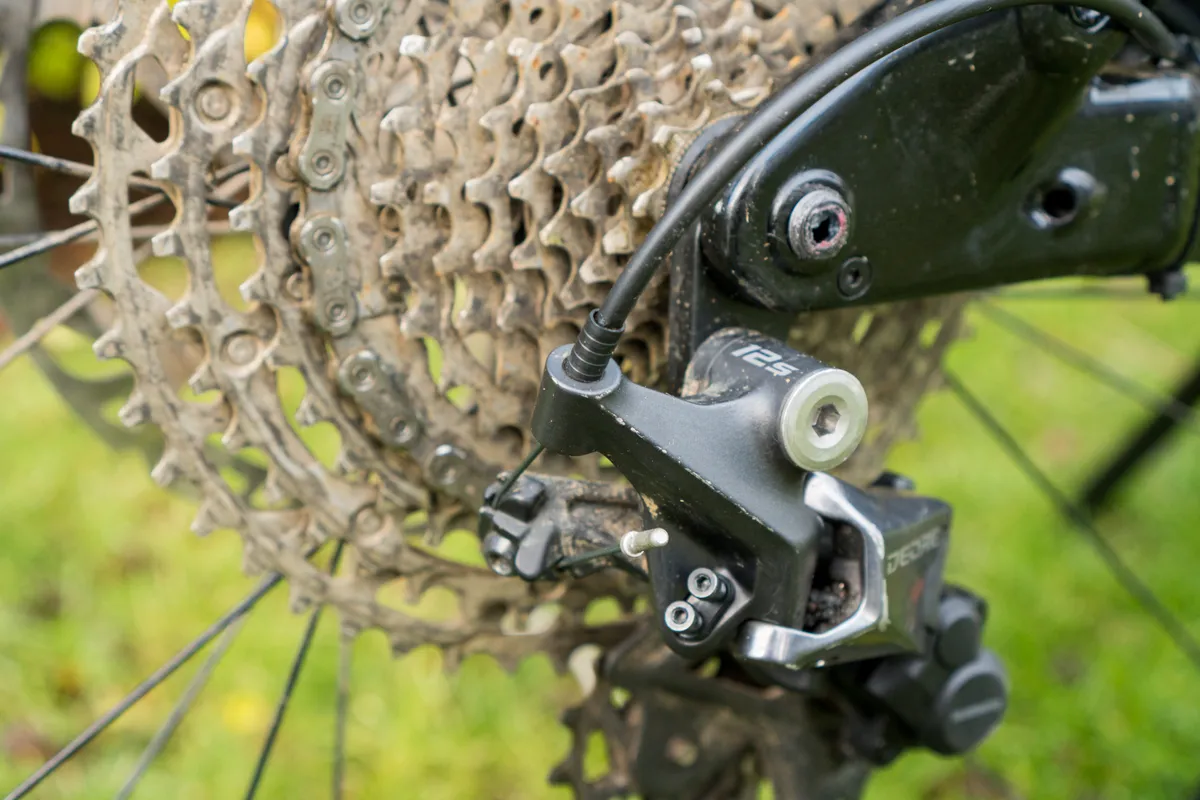
Deore M6100 groupset installation was a straightforward affair, following similar installation procedures as other groupsets. A few crucial steps must be taken to guarantee performance, though.
As mentioned, the chain must be installed with the stamped Shimano writing on the outside to ensure the HG+ technology works. Chain length must also be adjusted as per Shimano’s instructions to permit smooth shifting.
The mech’s B-tension and stopper plate also needs to be installed and set up correctly. To aid with B-tension set up, the inboard side of the derailleur’s cage has a stamped mark that needs to line up with the tip of the highest tooth on the largest sprocket of the cassette.
On the bike stand, derailleur indexing, cable tension and limit screw set up was easy.
However, setting the mech’s B-tension screw using Shimano’s settings proved to be borderline impossible. When winding on the B-tension so the marker was lined up with the largest cassette tooth, the derailleur’s jockey wheel was far enough away from the cassette to negatively impact shift quality.
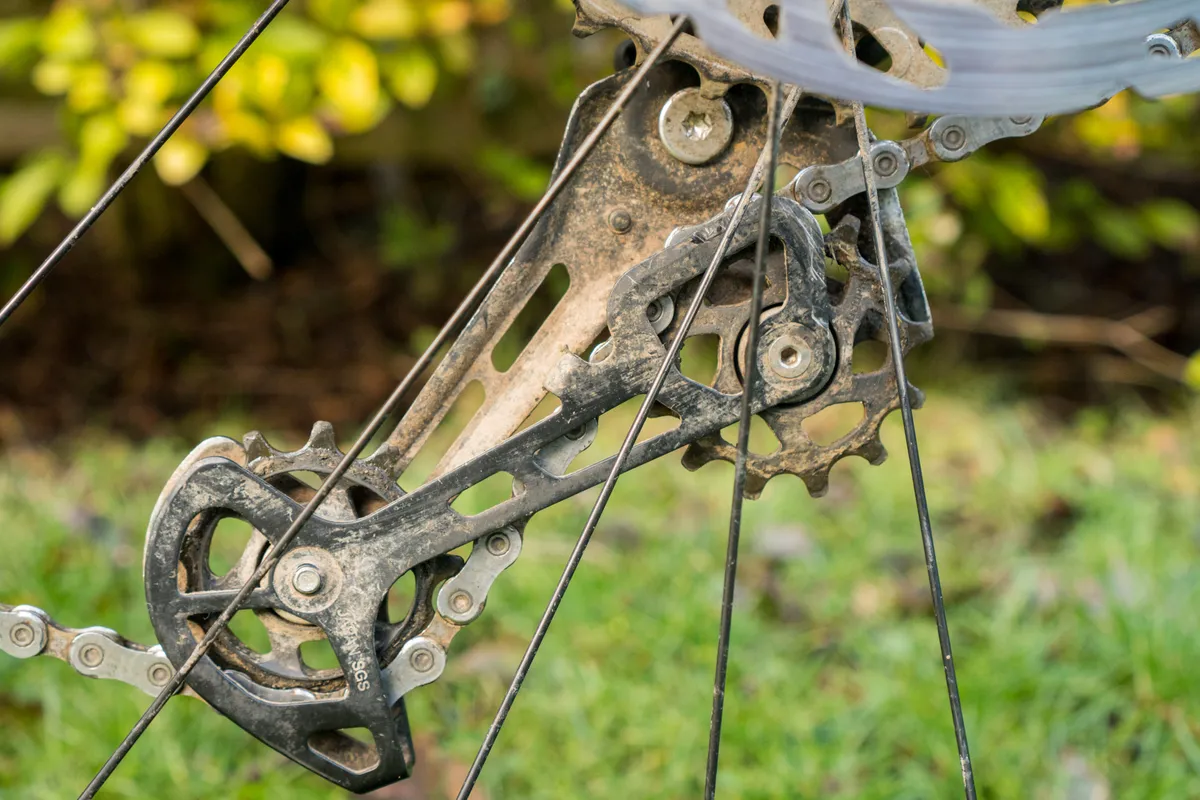
Likewise, when setting it in a similar way to SRAM’s recommendations – where the jockey wheel is much closer to the cassette – this also negatively affected shift quality.
After some trial and error, I found the compromise was to set the B-tension so the mech was halfway between Shimano and SRAM’s set up suggestions. Once set like this, shifting in the bike stand was reliable and crisp.
Shimano Deore M6100 groupset performance
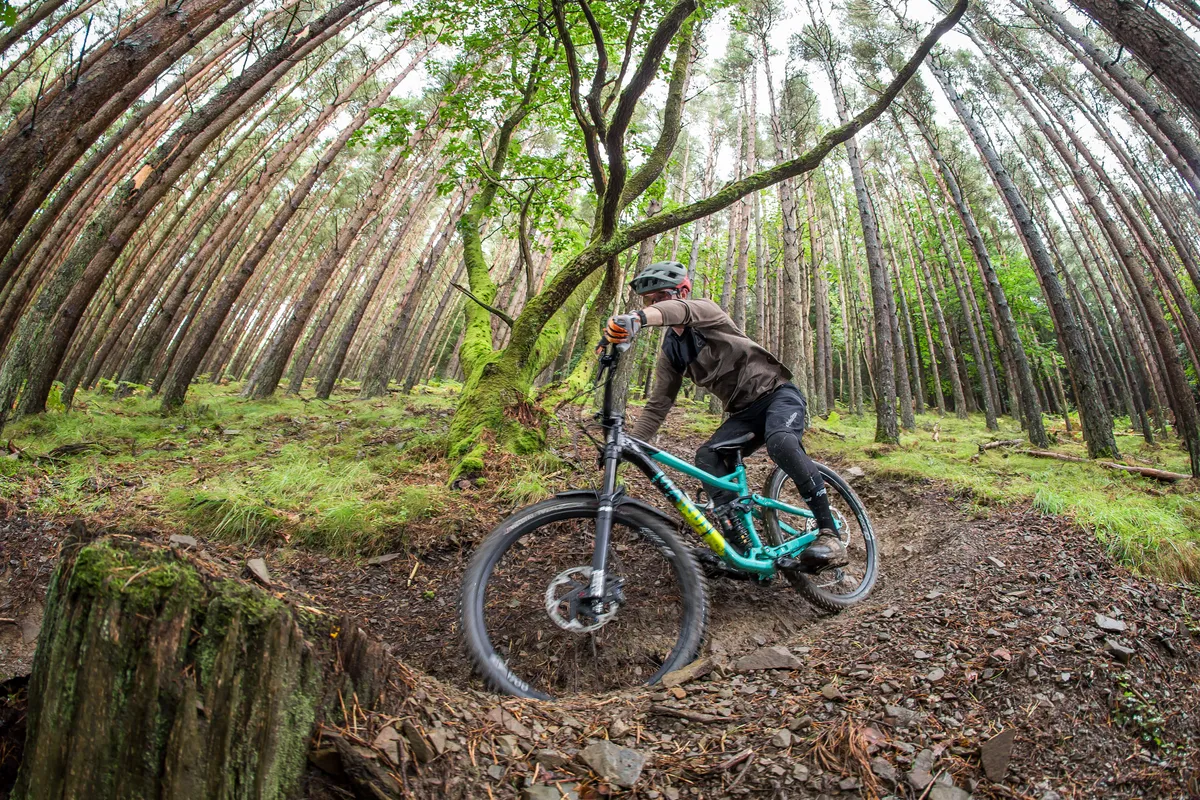
I’ve been hammering Shimano’s latest 12-speed Deore groupset on my BikeRadar Builds Marin Alpine Trail since May 2020 to bring you the most accurate long-term review possible.
Conditions have ranged from summertime dust and autumnal leaf litter to wintry bog, with a generous peppering of snow and ice. It would be fair to say the M6100 group has had a thorough testing, covering nearly 700 off-road kilometres.
Shimano Deore RD-M6100-SGS rear derailleur performance
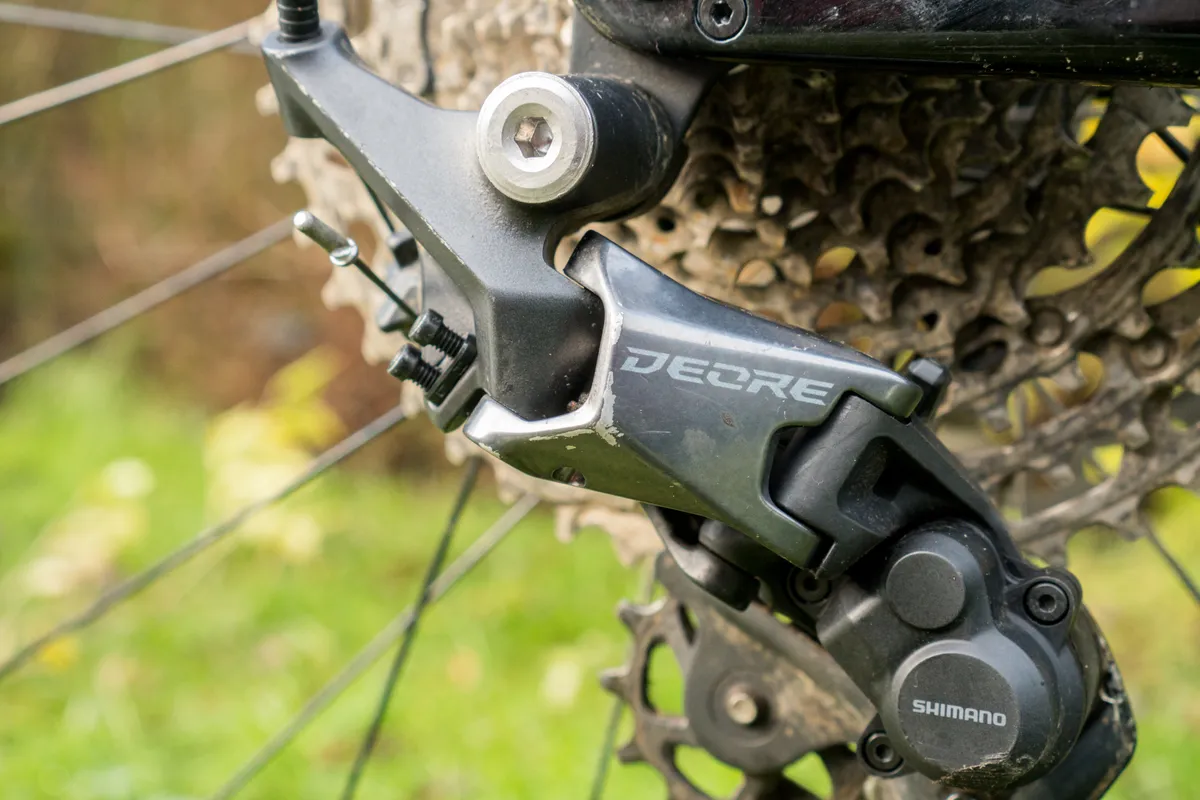
Overall shifting performance has been consistently above average no matter how dirty, unloved or bashed the mech has become. When it was performing as it should, the mech reliably shifted up and down the cassette block regardless of whether the chainset was under load or not (thanks to the HG+ system).
However, to get it to perform as I expected required a fair amount of trial and error with the B-tension screw. With it set as per Shimano’s recommendations, in the lower gears there was a persistent cough and sneeze from the mech as the pedals were turned. Shifting was also lazy, especially from low gears into higher gears.
Once I’d found the mech’s preferred B-tension (as mentioned before), shifts into lower gears were easy and resistance free. The shifter paddle required only a light push to move the mech up the gears and there was little crunching or clunking as it moved the chain.
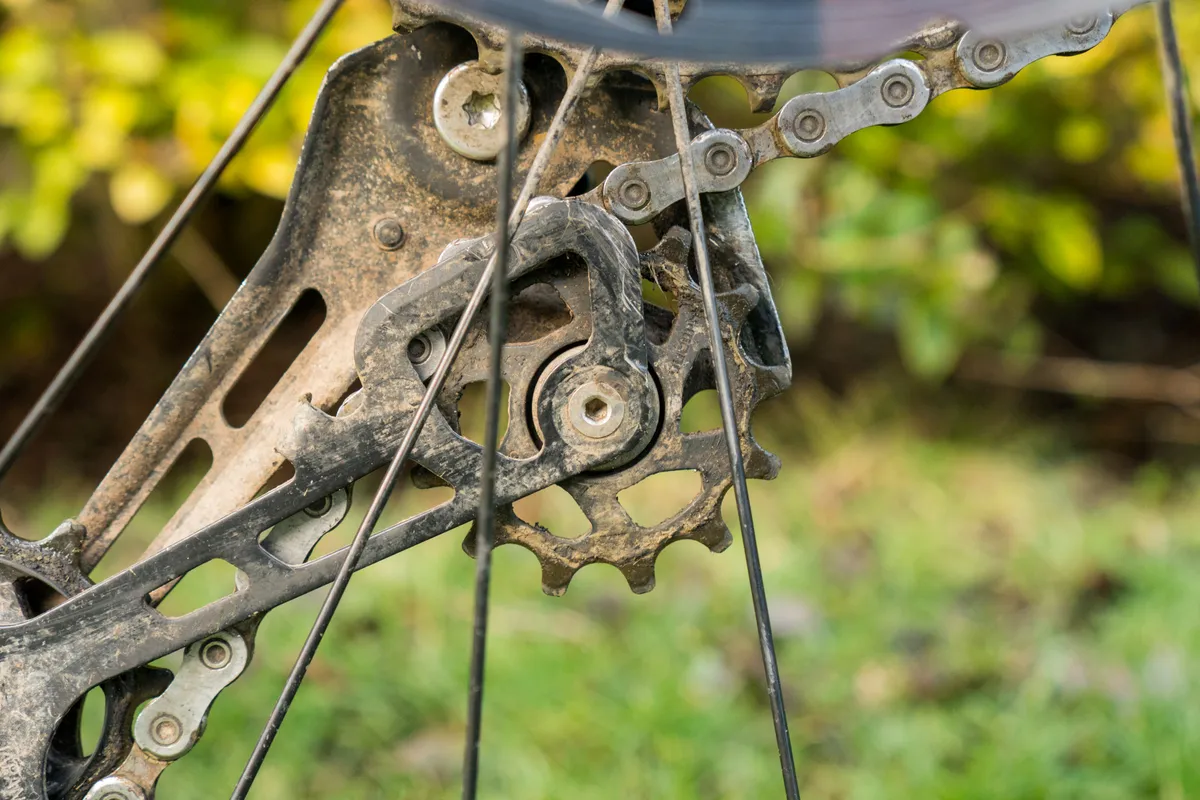
Around 400km into the test period, the chain started to derail between the lower jockey wheel and mech cage when it was set in the 51t cassette sprocket. Upon investigation it transpired that one of the teeth on the lower jockey wheel had become slightly deformed – presumably after an impact – causing the chain to jump off.
I replaced the jockey wheel with a new one – Deore uses the same wheels as SLX wheels and they cost £9.99 for two – which cured the problem, and it hasn’t happened again.
The clutch provided an excellent balance between chain stability and not interfering with gear shifts. In fact, the mech did a sterling job of virtually eliminating chainslap, helping to keep the bike quiet and the chain firmly positioned on the chainring.
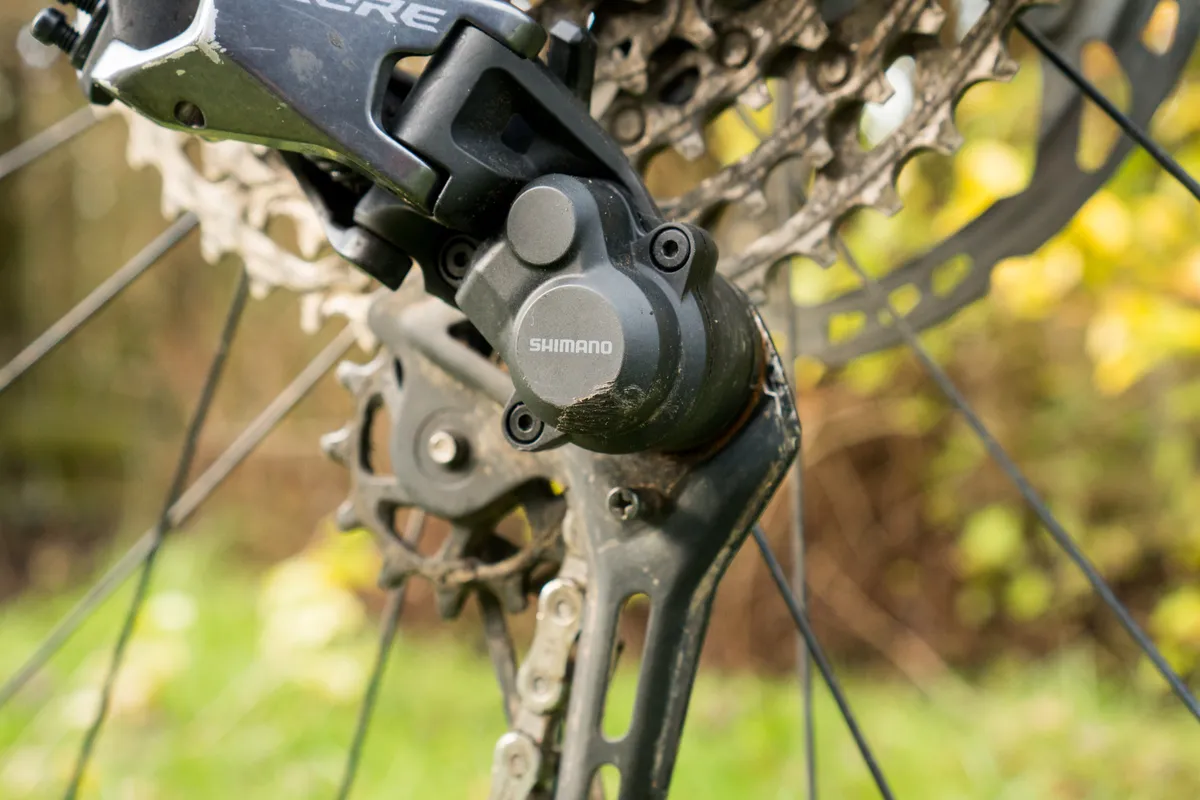
The clutch on/off lever proved to be helpful when removing the back wheel. Furthermore, should you wish to increase or decrease clutch tension for your preferences, it is adjustable.
The mech brushed off bashes and knocks well. Both its parallelogram and cage have remained totally true despite bearing marks that should suggest otherwise. Likewise, its pivots have remained impressively tight and there are only very limited amounts of side-to-side slop, but certainly not enough to affect shift performance.
How to fix a slow/hesitant upshifting Deore M6100 12-speed rear derailleur
I’ve heard reports that people using 12-speed Deore M6100 rear derailleurs have suffered from lazy or slow upshifting, where the mech is reluctant to move the chain from a lower gear to a higher one, and is most pronounced when shifting from the 51t to 45t cassette sprocket.
Although I didn’t personally suffer from this problem, there appears to be a few factors causing this issue, so it’s certainly worth addressing.
If your Deore M6100 derailleur is suffering from lazy upshifting, first verify the derailleur is set up as per Shimano’s instructions on its website – you need to start from a clean slate. If lazy upshifting persists, a few simple steps should help improve performance.
Crucially, verify your gear cable is installed correctly and is rust- and dirt-free, and can move within the gear outer housing freely.
Next up, make sure all of the derailleur’s parallelogram pivots are clean, free from rust and well-lubricated with something suitable – I recommend a thin grease such as SRAM Butter or a wet weather chain lube – and that any excess lubricant is removed and religiously cleaned after each dirty ride to help maintain performance.
Then make sure the derailleur’s pivots are free to move so that its spring doesn’t have to work as hard to move the derailleur from low gears to higher ones.
Next, inspect the derailleur’s clutch for dirt, rust or contamination. The Shimano Deore M6100 clutch is accessible by undoing three 2mm Allen key bolts and removing the cap.
If the clutch mechanism is dirty, has become rusted or is contaminated with too much oil or grease, it will cause the cage to become too stiff – in the same way increasing clutch resistance does – and hinder upshift performance.
Once the clutch is cleaned and lubricated to meet factory specifications, the mech’s performance should improve.
Shimano Deore SL-M6100-R shifter performance
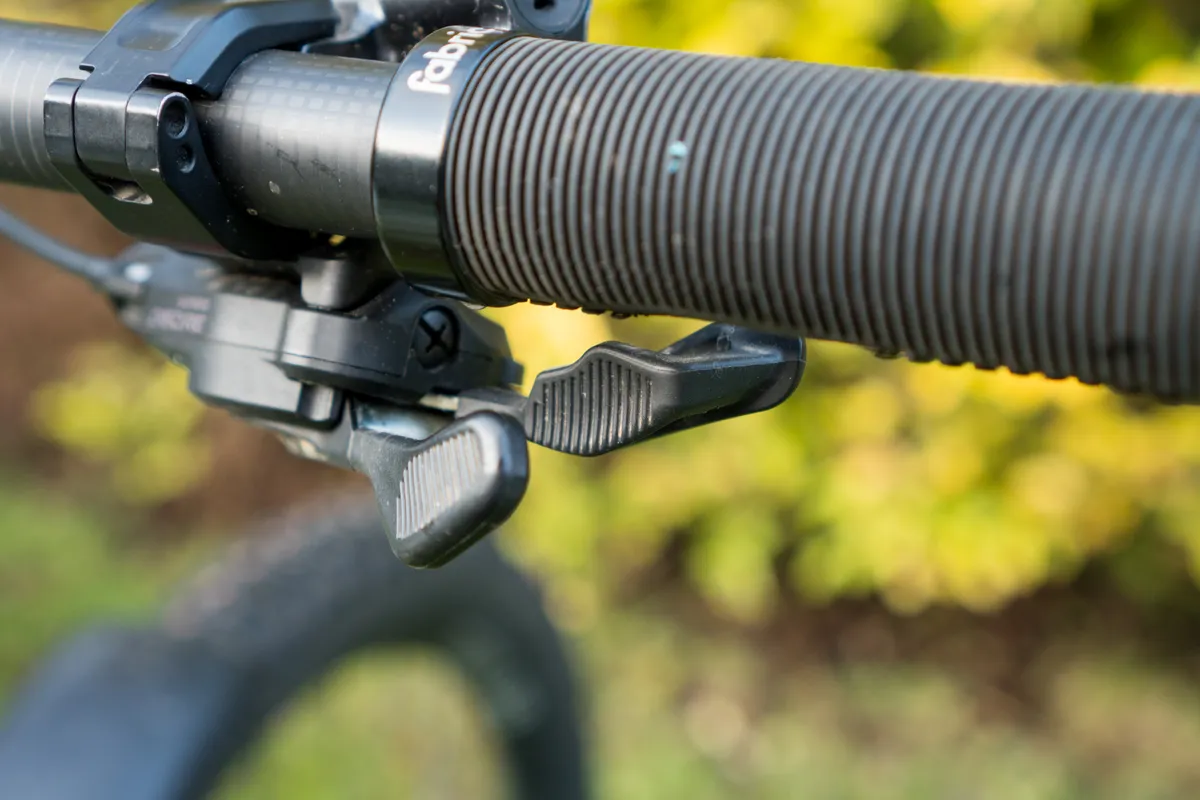
Gear shifts felt reliable and light. Although each change was solidly defined from the next, it would be a stretch to describe the lever’s action as pristinely crisp or premium, like you’d experience with XT, XTR, or SRAM’s GX or X01 groupsets.
Shifting is a generally pleasant and fuss-free experience, though, and I never found myself having to compensate for missed shifts by changing two gears at once.
The shifters' ergonomics are spot on; the paddles are the perfect length, making them easy to reach and they have a great, grippy shape. This means it’s virtually impossible for your fingers to slip off when shifting.
I appreciated the two-way release on the high gear lever and frequently found myself switching between thumb and finger shifter actuation.
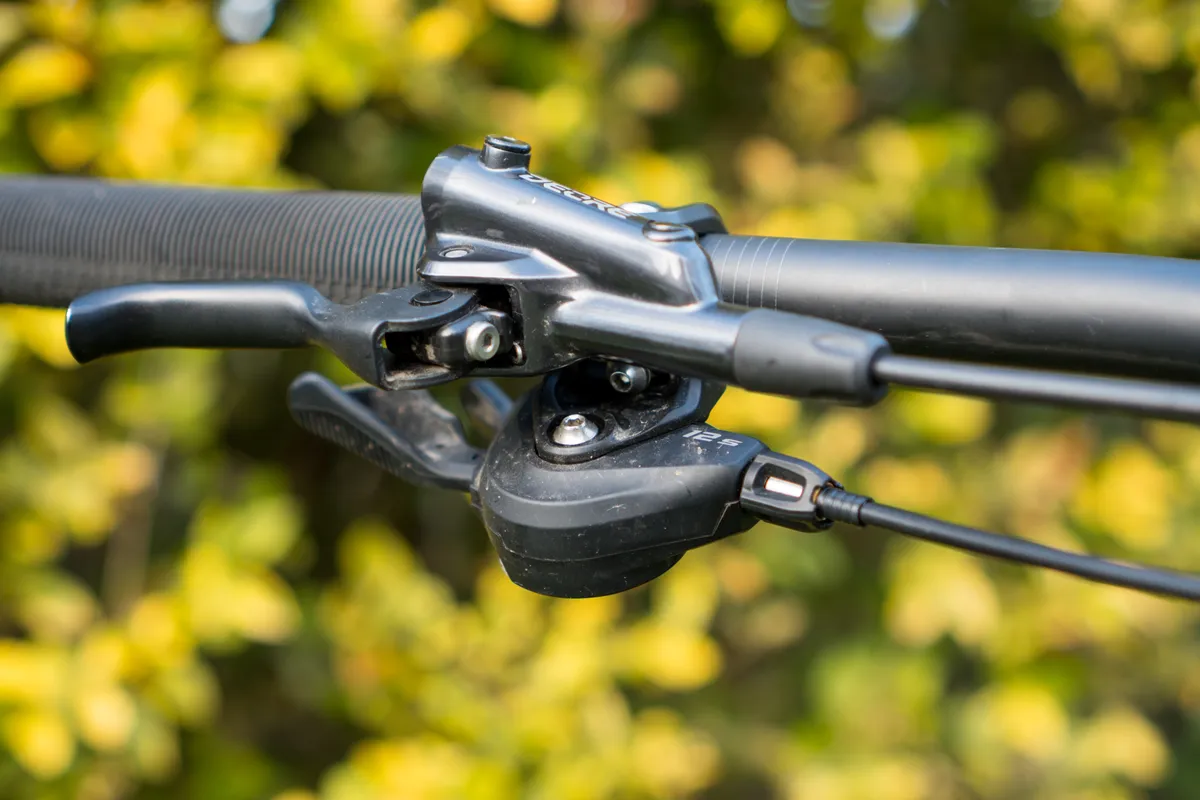
Some people may miss the multi-release high gear lever found on Shimano’s more expensive offerings. I personally preferred the single shift action and found it meant I never accidentally changed two gears when I didn’t mean to.
Over time I expected the shifting action to degrade, but this wasn’t the case and the Shimano-supplied gear inner and full-length outer cable maintained as-new shift quality during the test period, despite a rather care-free maintenance routine.
Similarly, the shifter’s internals have remained clean and without rust.
Shimano Deore CS-M6100-12 cassette and Shimano Deore CN-M6100 chain performance
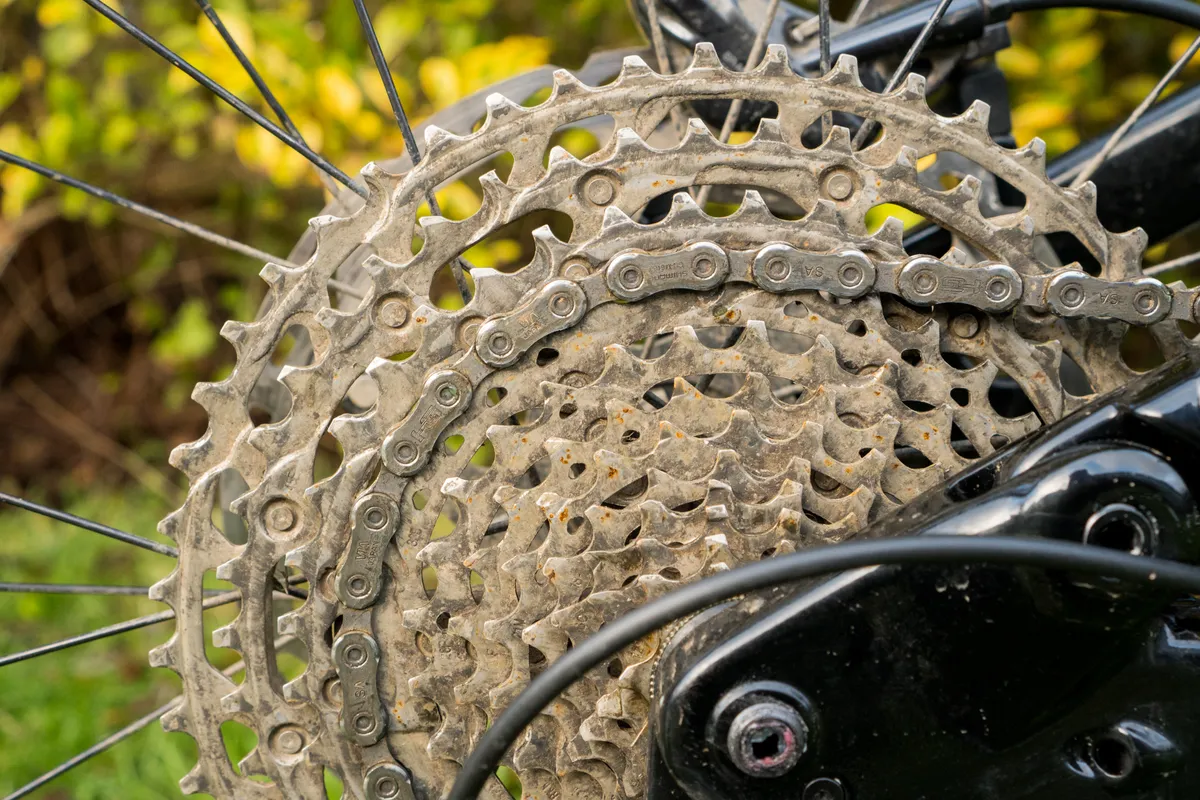
Shimano’s 10-51t cassette has a great range with really usable steps between gears. This meant I found myself using the 39t and 45t sprockets more than I was expecting, especially in scenarios when I would have jumped up to SRAM’s 50t or 52t ring almost immediately.
The smaller increments between the lowest two gears made finding a comfortable climbing cadence much easier than offerings with larger steps.
Shifts between gears – as with the mech and shifter – were smooth. Once everything was set up to perform best, there was never any laziness or harsh shifts, even when hard on the power, despite the whole drivetrain making some slightly unreliable sounding noises when being pushed.
The Deore CS-M6100-12 cassette is heavy. Increasing your bike’s unsprung mass or wheel weight can negatively interfere with how the suspension works and its general handling, making lighter cassettes an attractive offering. Those concerned with saving weight might want to consider upgrading to the more costly, but lighter, SLX, XT or even XTR cassettes to save some grams.
The cassette’s weight also means it’s built to last. My test sample is showing minimal signs of tooth wear and cleans up spotlessly even after being left to rust.
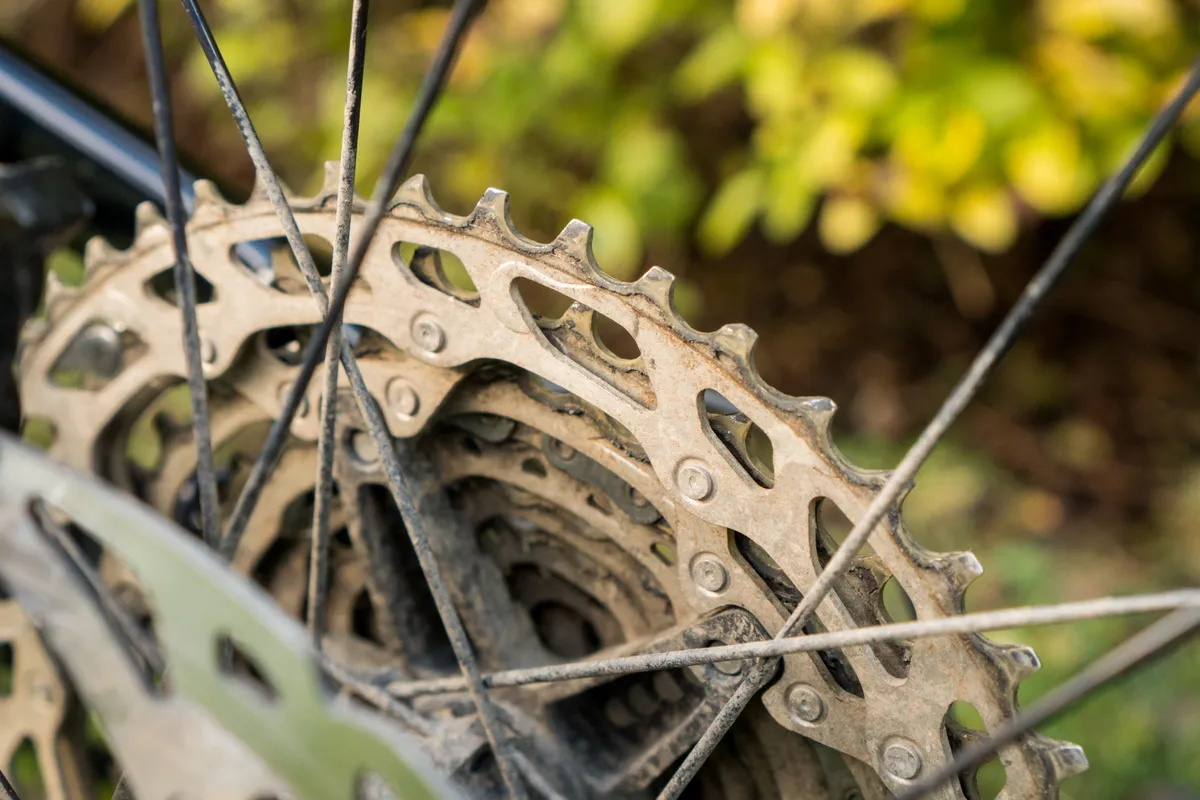
I haven’t personally encountered any issues with the cassette creaking on the Microspline freehub body, but I do know some people have complained of this issue. The known remedy for a creaking Microspline cassette is to liberally apply grease to the freehub’s splines prior to installation.
The 12-speed chain hasn’t fared so well. After just under 500km of testing it broke while under load. I put the initial incident down to bad luck or a freak incident with a rock, and re-joined and replaced the broken link with a split link.
The chain subsequently broke another two times in different places, its wide links splitting open. Once this had happened, I replaced the chain with a new one and have since put in an additional 200km on the drivetrain without issue.
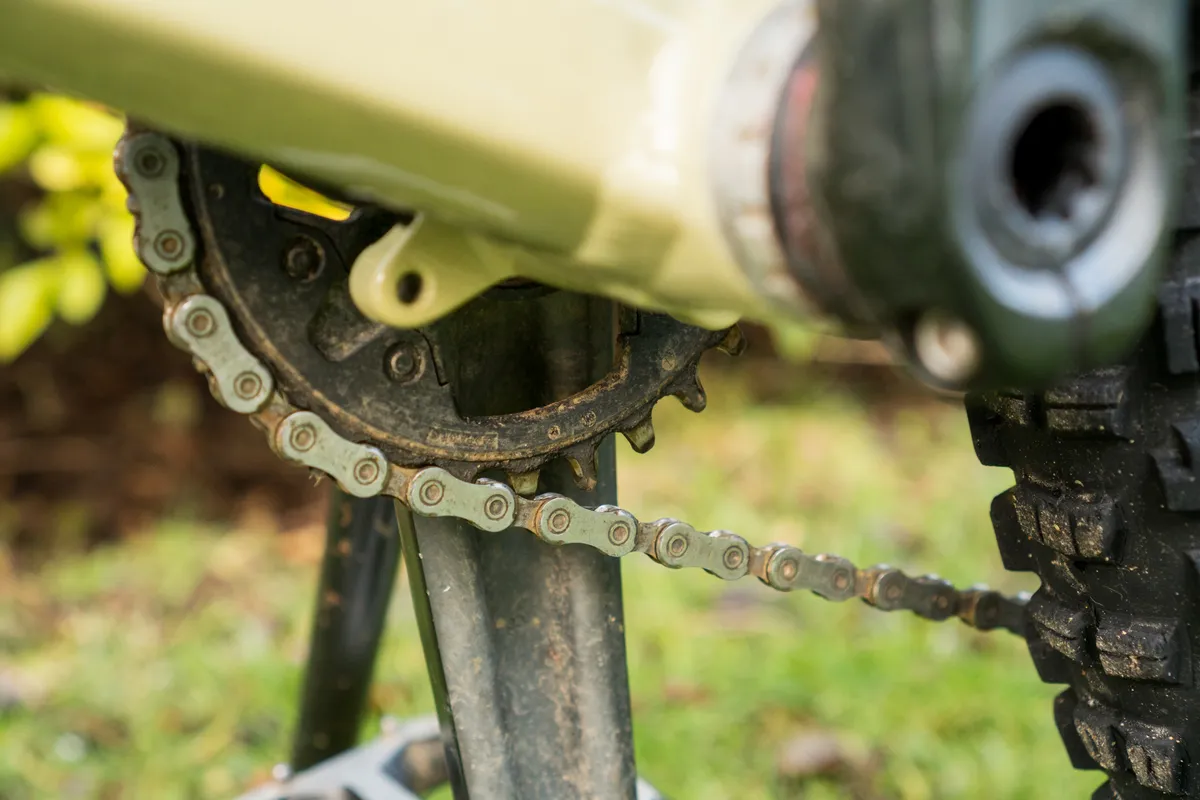
I am also running a Shimano XT 12-speed chain, cassette and chainring on another bike and have experienced the exact same issue with the chain snapping after just over 500km of use.
It appears the Shimano 12-speed chains I’ve tested, while fairly light and HG+ tech-equipped, have a pretty short and finite lifespan when subjected to heavy-going off-road conditions.
On the plus side, Deore chains aren’t very expensive at £24.99 / $23.99 retail, but remember to include a compatible 12-speed quick-link in your riding pack in case you encounter a similar mishap.
Shimano Deore FC-M6100-1 crankset with 30t chainring performance
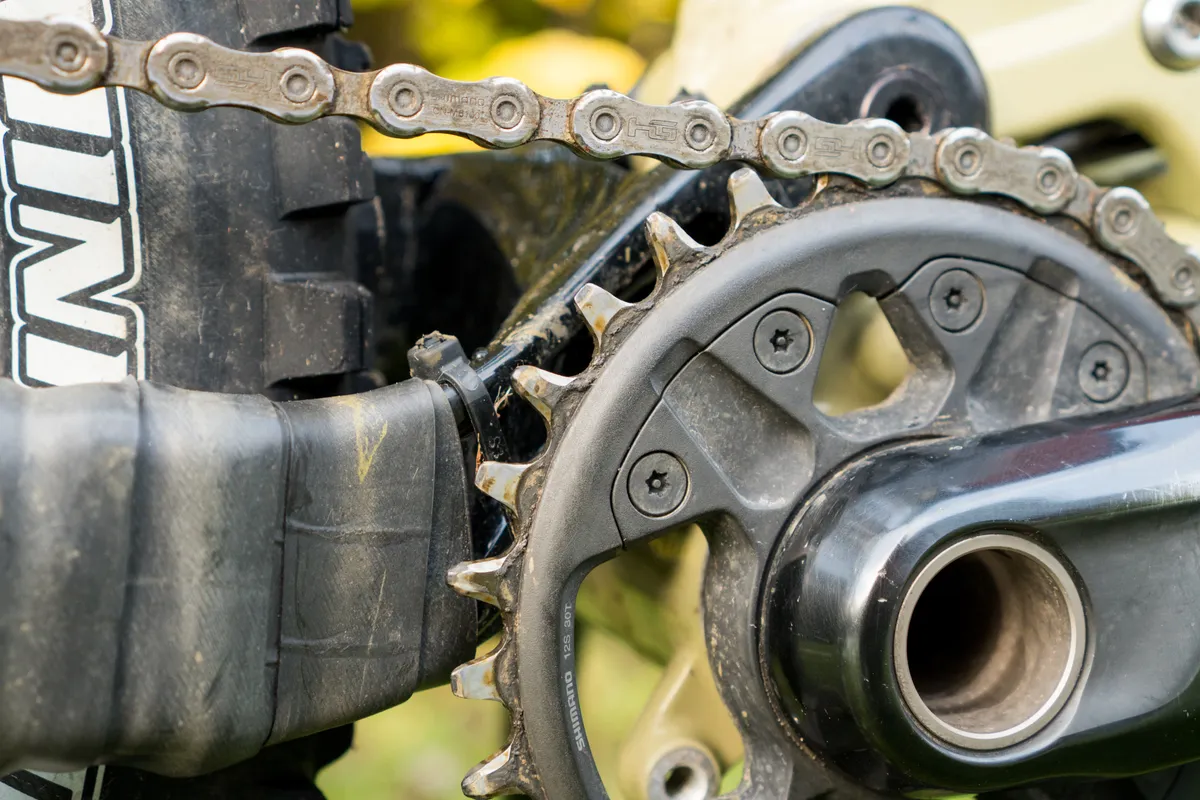
The Deore FC-M6100-1 crankset’s forged construction and 782g weight mean it has been robustly reliable for the duration of the test period, even managing to resist the vast majority of foot rub and wear, retaining its finish well.
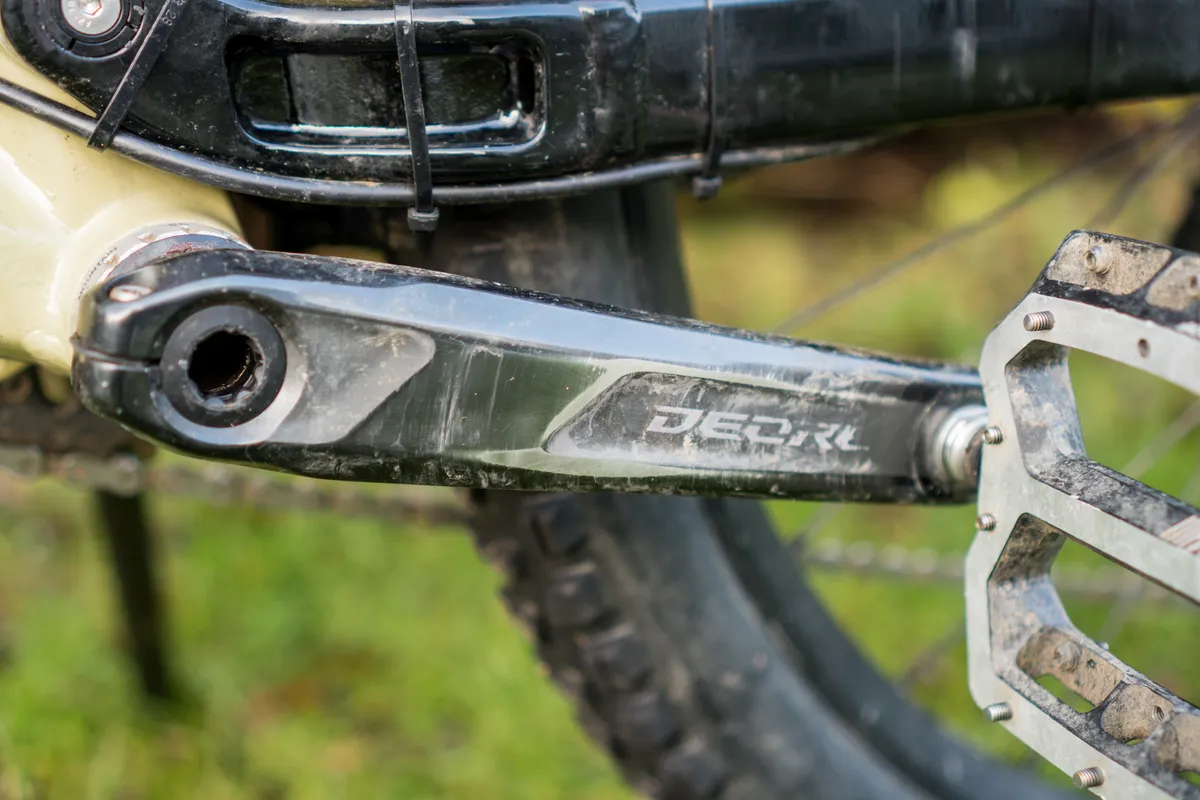
The chainring hasn’t developed excessive teeth hooks and neither have the teeth been ground down in height or width enough to negatively impact performance.
It’s also remained straight and true for the whole test period and hasn’t dropped once, despite me using the drivetrain without a chain device.
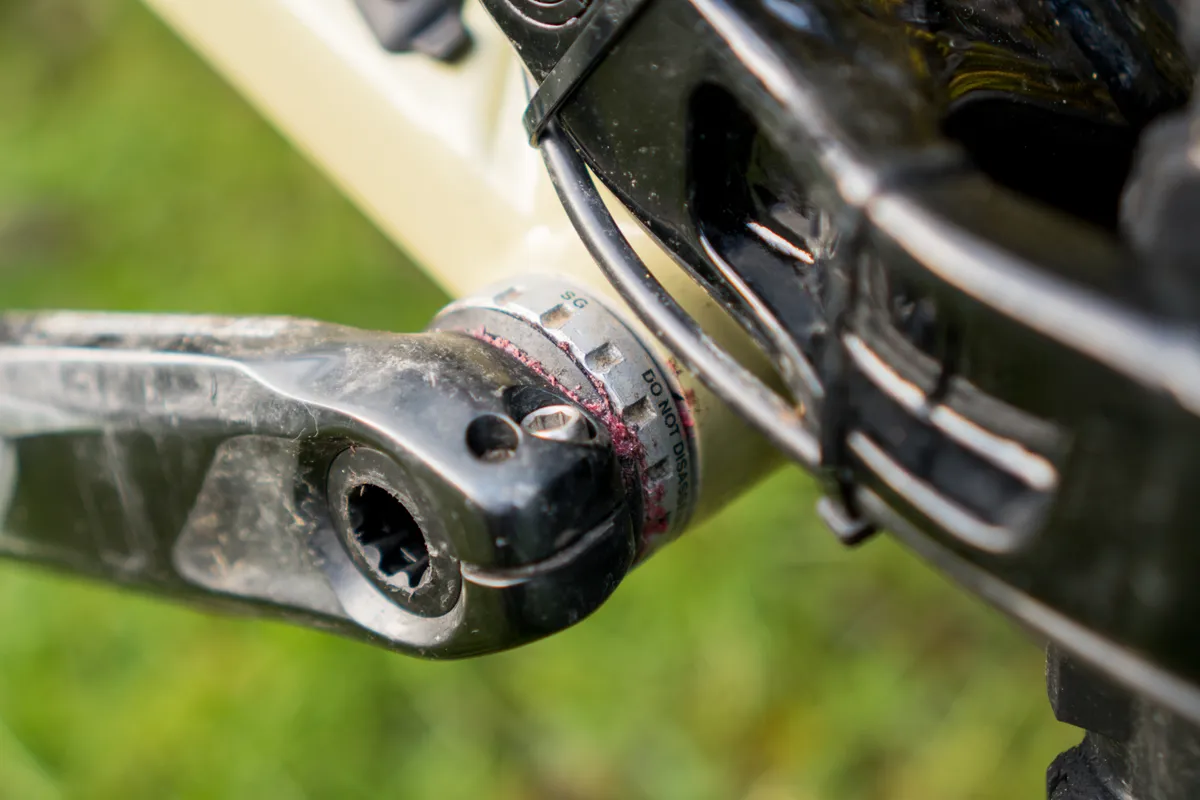
A notable shout-out goes to the SM-BB52 Deore-level 73mm BSA bottom bracket that is still running as smooth as it was the day it was installed.
How does Shimano’s Deore M6100 groupset compare to SRAM’s NX and GX Eagle?
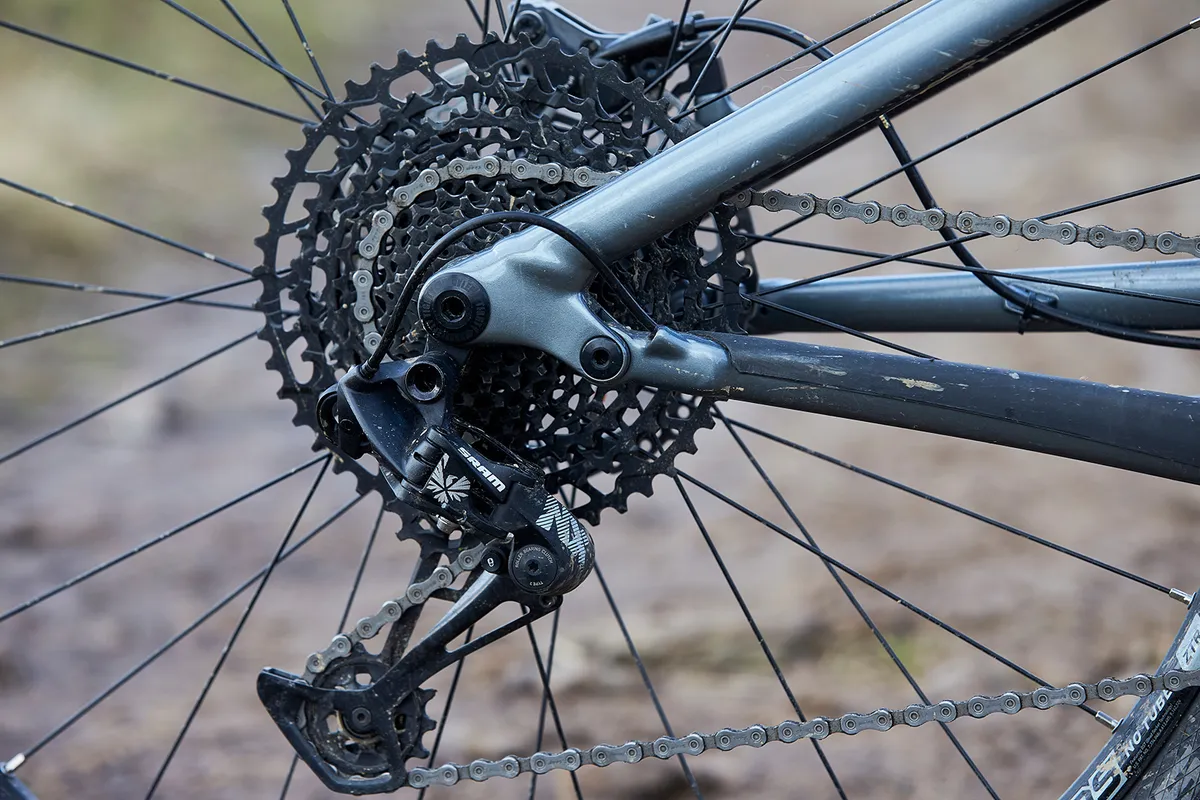
Comparing groupset cost, Shimano’s Deore M6100 is most like SRAM’s NX Eagle range. Deore’s full house of parts costs £285.95, while NX Eagle is €410, or roughly £363.
However, a Deore groupset does require its own dedicated Microspline freehub driver, whereas SRAM’s NX uses the older HG freehub standard.
If you’re looking to upgrade your current freehubs, prices for replacements – if they even make a Microspline freehub for your hubs – can range in cost from £20/$20 for the cheapest right the way up to £150/$150 for the most expensive.
Performance-wise, Deore is firmly ahead of NX in terms of shifting feel, with a considerably more precise overall feel. Likewise, general build quality is also good, helping Deore inch ahead of NX for reliability.
The mech shrugs off knocks and bashes, and while the NX mech is fairly hardy, its pivots and main attachment point have a habit of developing play quicker than expected.
The disparity in retail price between SRAM’s GX Eagle groupset – that costs £495 / $545/ €555 – and Deore seems vast, yet Deore is snapping at the heels of SRAM’s mid-range groupo in terms of feel and performance.
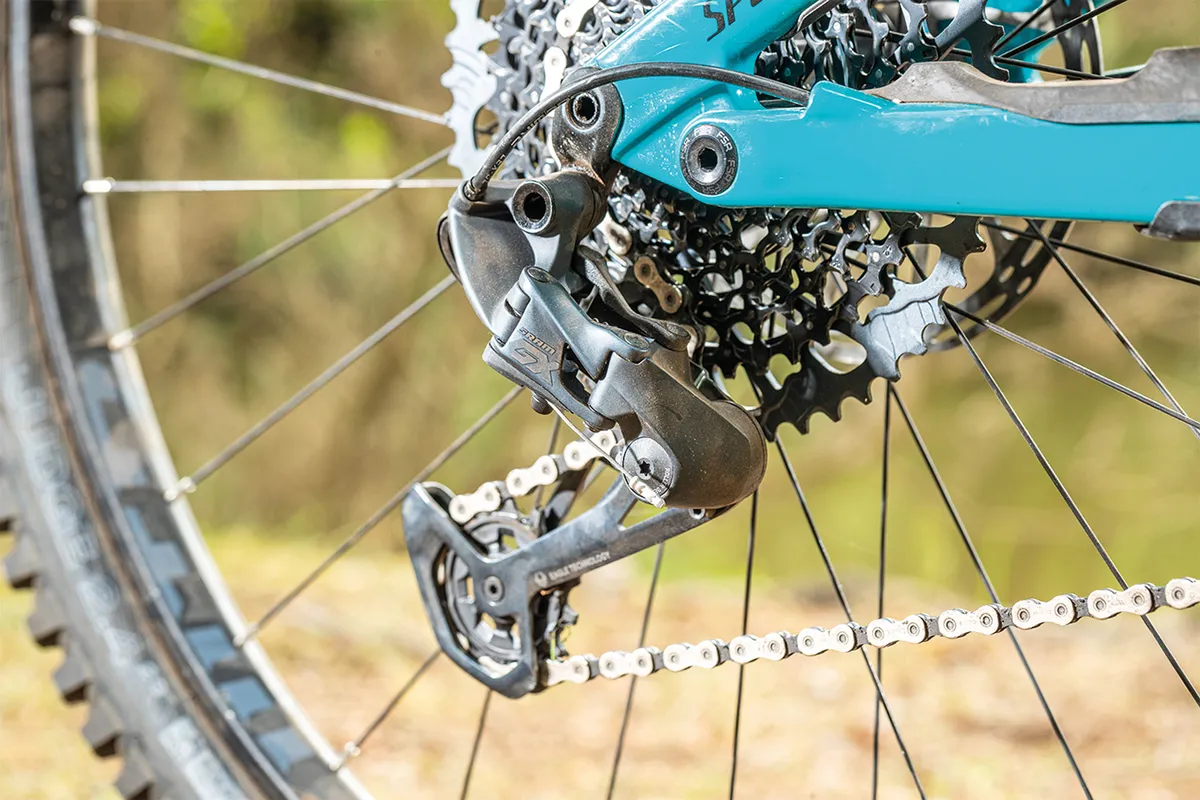
With GX you’ll run into the same freehub body dilemma as Deore (SRAM uses its own XD freehub body for its 10-50t and 10-52t cassettes), and although SRAM has one extra tooth on its biggest cog, I found the jump between Shimano’s easiest two ratios much better spaced and more usable in real life terms on steep climbs than the Eagle offering.
Where does that put Deore in terms of its competitors, then? It sits in a performance middle ground between SRAM’s NX and GX Eagle, but costs considerably less.
As far as comparing it to other Shimano groupsets, it treads quite confidently on the coattails of SLX and XT, benefitting from plenty of trickledown tech.
I’d wager that if you were blindfolded you wouldn’t be able to distinguish huge performance differences – or even improvements – between the three groupsets.
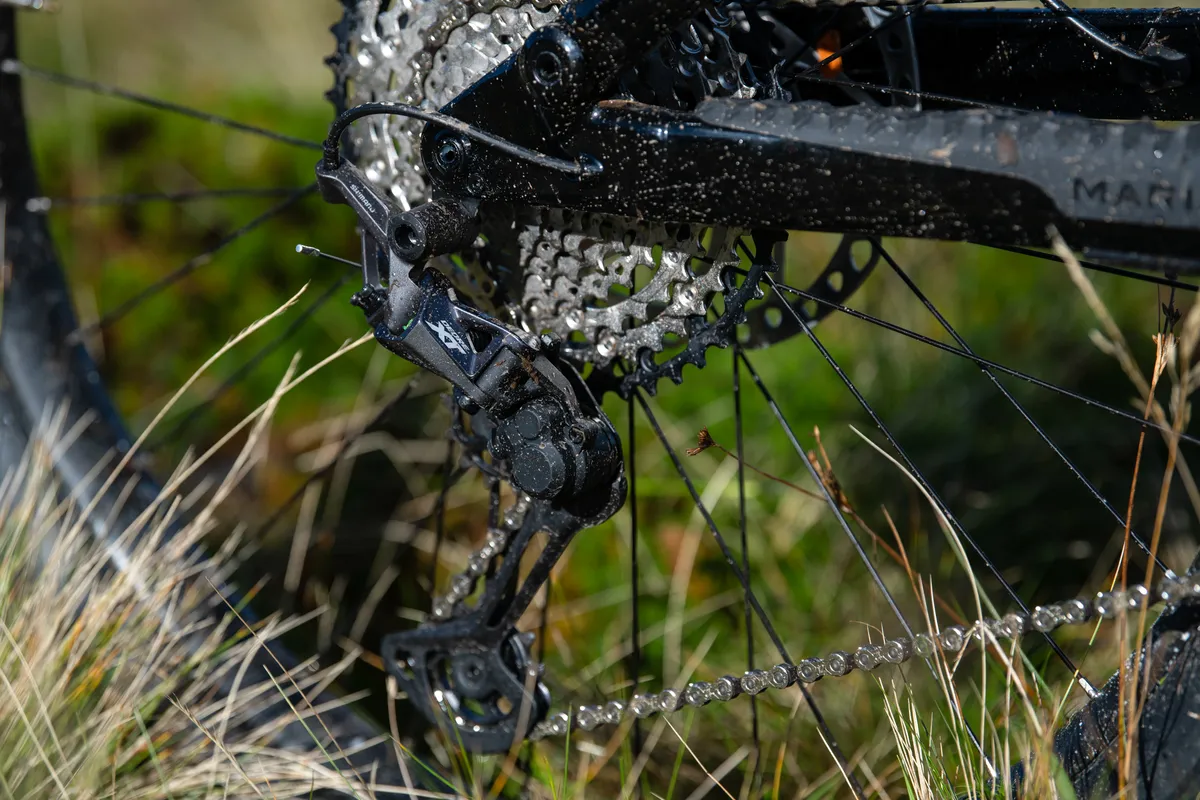
Yes, Shimano XT is quite a bit lighter – and that’ll certainly matter to some – but the 12-speed Deore package is mighty impressive given its price.
A quick win upgrade that would enhance Deore shifting feel would be to swap out the shifter for an XT model, at an increase in cost to the whole package of a mere £23.
Shimano Deore M6100 groupset bottom line
There’s no denying that Shimano’s Deore 12-speed groupset offers some of the best value performance and reliability out there.
It’s not without its faults, although they’re few and far between. If I was spending my money on a full groupset, as it currently stands, I’d struggle to justify buying anything other than a full Deore setup – shifter and chain included.
And given how many bikes are coming supplied with Deore 12-speed, it seems that plenty of OEM manufacturers agree.
Product
| Brand | Shimano |
| Price | £285.95, $297.95 |
| Weight | 2201g |
| br_whatWeTested | Shimano Deore M6100 12-speed |
Features
| Crank options | 1x |
| Speed | 12 |
| Cassette options | 12 speed, 10-12-14-16-18-21-24-28-33-39-45-51t |
| Chainring options | 30t, 32t |
